最新Unit1Hello(1)汇编
- 格式:doc
- 大小:50.00 KB
- 文档页数:4
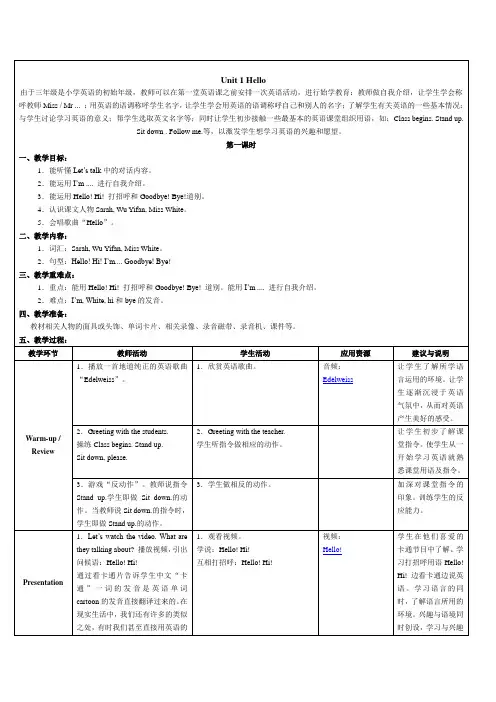
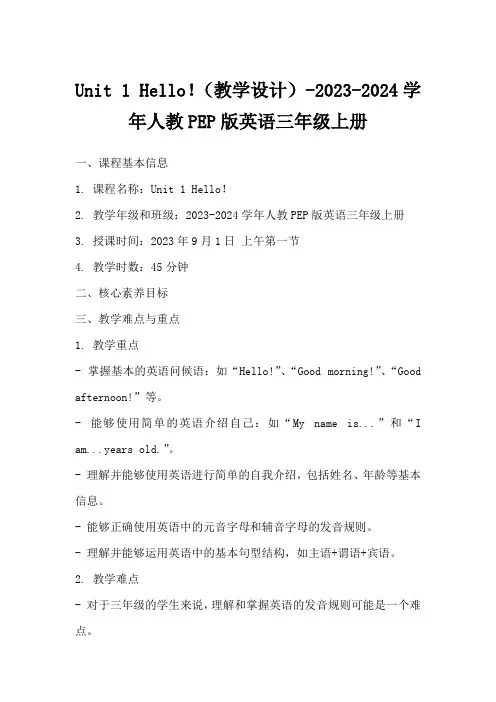
Unit 1 Hello!(教学设计)-2023-2024学年人教PEP版英语三年级上册一、课程基本信息1. 课程名称:Unit 1 Hello!2. 教学年级和班级:2023-2024学年人教PEP版英语三年级上册3. 授课时间:2023年9月1日上午第一节4. 教学时数:45分钟二、核心素养目标三、教学难点与重点1. 教学重点- 掌握基本的英语问候语:如“Hello!”、“Good morning!”、“Good afternoon!”等。
- 能够使用简单的英语介绍自己:如“My name is...”和“I am...years old.”。
- 理解并能够使用英语进行简单的自我介绍,包括姓名、年龄等基本信息。
- 能够正确使用英语中的元音字母和辅音字母的发音规则。
- 理解并能够运用英语中的基本句型结构,如主语+谓语+宾语。
2. 教学难点- 对于三年级的学生来说,理解和掌握英语的发音规则可能是一个难点。
- 使用英语进行自我介绍时,可能会有混淆和遗忘的问题,需要通过多次练习来巩固。
- 学生可能不熟悉英语中的元音字母和辅音字母,需要通过直观的图像和示例来帮助他们记忆。
- 英语句型结构的理解和运用可能会有一定的难度,需要教师通过实例和练习来逐步引导。
- 学生可能对英语中的语法规则感到困惑,需要教师通过简单易懂的方式进行讲解和练习。
四、教学方法与策略1. 选择适合教学目标和学习者特点的教学方法- 采用讲授法,通过教师的讲解和示范,帮助学生掌握基本的英语问候语和自我介绍的表达方式。
- 采用讨论法,鼓励学生积极参与课堂讨论,练习使用英语进行自我介绍和与他人打招呼。
- 采用案例研究法,通过分析实际生活中的英语使用场景,帮助学生理解和运用所学知识。
- 采用项目导向学习法,让学生分组完成一个简单的英语自我介绍任务,培养他们的团队合作能力和自主学习能力。
2. 设计具体的教学活动- 角色扮演:学生分组进行角色扮演,模拟在不同的场合使用英语进行自我介绍和打招呼。
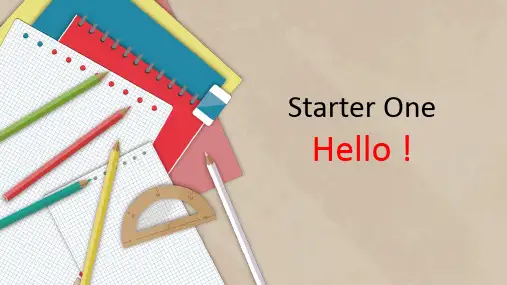
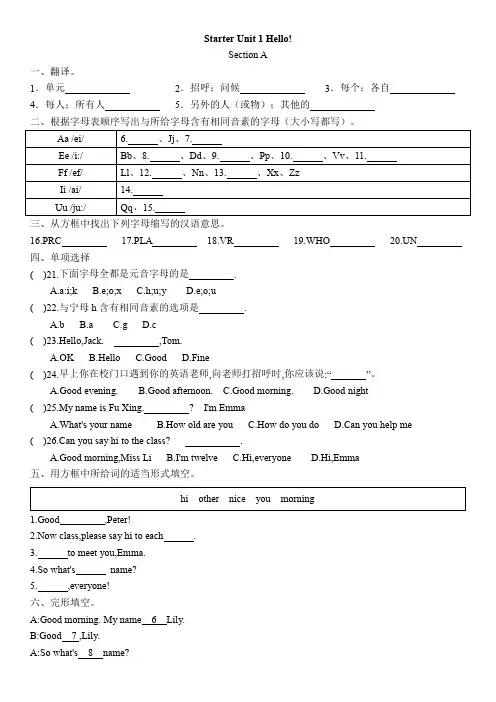
B:Oh,I'm 9 .A:Nice to meet you,Li Hua.B:Nice to meet you 10 ,Lily.( ) B.are C.am D.be( ) B. afternoon C.morning D.evening( ) B.your C.her D.his( )9.A.Li Mei B.Lily C.Teng Fei D.Li Hua( ) B.also C.either D.often七、阅读理解。
A: Good morning!B: Good morning!A:Are you Jack Green?B:No. I'm Mike Smith. I'm from America. Jack is my good friend.What's your name,please?A:My name is Zhang Peng. I e from China.And this is my mother.B:Nice to meet you.C:Nice to meet you too.B:Have a good day!C:Thanks.You.too.( )11.Mike Smith, Zhang Peng and Zhang Peng's mother meet .A.in the morningB. in the afternoonC.in the eveningD.at night( )12.Jack Green and are good friends.A.Zhang PengB.Zhang Peng's motherC.Mike SmithD.Zhang Peng's father ( )13.The woman is motherA.Jack Gircen'sB.Zhang Peng'sC.Mike Smith'sD.Jack Smith's ( )14.Is Mike Smith a Chinese boy?A.Yes.he is.B.No.he isn't.C.No,she isn't.D.Yes, she is.( )15.Is Zhang Peng a Chinese boy?A.Yes,he is.B.No,he isn't.C.No,she isn't.D.Yes,she is.Section B一、根据句意和所给提示写出单词。
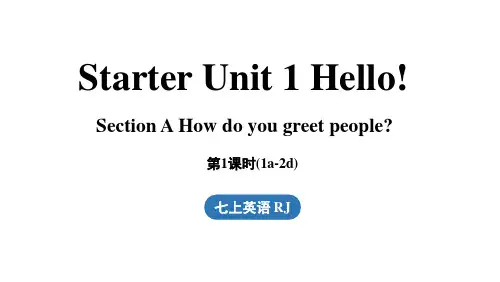
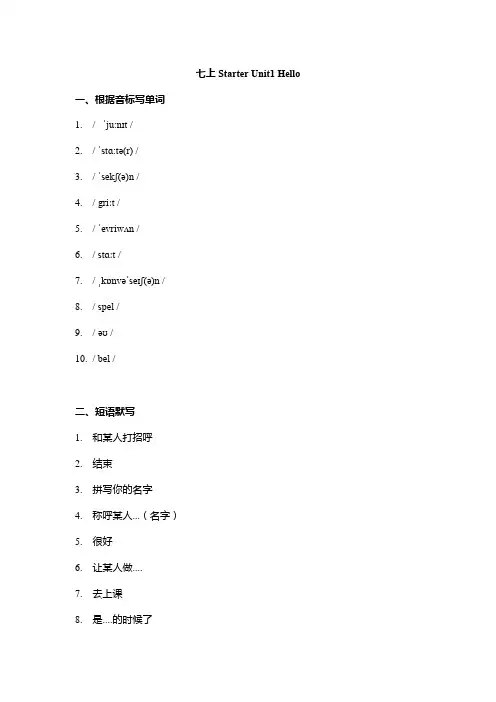
七上Starter Unit1 Hello一、根据音标写单词1./ ˈju:nɪt/2./ ˈstɑ:tə(r) /3./ ˈsekʃ(ə)n /4./ griːt /5./ ˈevriwʌn /6./ stɑːt /7./ ˌkɒnvəˈseɪʃ(ə)n /8./ spel /9./ əʊ /10./ bel /二、短语默写1.和某人打招呼2.结束3.拼写你的名字4.称呼某人...(名字)5.很好6.让某人做....7.去上课8.是....的时候了二、重点知识讲解1. hello&hihello “你好”,是朋友、亲人或者熟人之间非正式的问候语,可以用来表示问候、打招呼或引起对方注意,回答时用hello或hi均可。
hi 和hello一样也是“你好”的意思,在美国用的非常普遍,不仅用于熟人之间,也用于陌生人之间,比hello更简洁和随便,尤其用于擦肩而过的打招呼。
2.Good morning.“Good morning.”意为“早上好,上午好。
”,适用于比较正式客气的场合,用于早晨或上午(中午12点前)向他人问候。
“Good afternoon.”,下午好。
用于下午12点到18点这一时间段。
“Good evening.”,晚上好。
用于晚上18点到21点这一时间段。
Good night!晚安(晚间告别用语)3.How are you? 你(身体)好吗?-I'm fine,thanks. How are you?我很好,谢谢。
你好吗?—I'm OK.我很好。
有时出于礼貌还要反问对方的身体状况:How are you? / And you? 我很好。
谢谢。
你呢?应答语一般是:(I’m) fine/OK, too. 我也很好练习一、单选1.—I _______ a student. _______ you a teacher?—Yes, I am.A.am;Am B.is;Are C.am;Are D.are;Is 2.This is my T-shirt. His T-shirt __________ yellow.A.is B.am C.are3.I ________ in Class 3 and my sisters ________ in Class 2.A.am; is B.am; are C.are; am D.is; are 4.Look! Some apples ________ on the box.A.is B.are C.am D.be5.I ________ a boy, and Helen ________ a girl.A.am;is B.is;am C.am;are D.are;am6.Tom and Jack ________ friends.A.is B.am C.are D.be7.— ________ you Miss Read?—Yes, my name ________ Sue Read.A.Are, am B.Are, is C.Is, are D.Is, is8.________ Gina.This is ________ book.A.I’m, my B.I’m , an C.She’s, his D.He’s, her 9.—Hello, I’m Gina.—________A.Hi, Gina. I’m Alan. B.Good morning. C.Yes, I am.D.How are you?10.________ name is Helen and ________ name is Frank.A.Her; her B.His; his C.Her; his D.His; her 11.Look! Some keys ________ on the desk.A.is B.am C.are D.be 12.I ________ a teacher but you ________ students.A.is; am B.am; are C.am; is D.am; are 13.Our shorts ________ only 22 dollars.A.am B.is C.are 14.Tom and I _________ good friends.A.am B.is C.are D./ 15.—How ______ your mother?—She _______ fine.A.am; is B.is; is C.is; am D.are; is二、用所给词的适当形式填空1.This is _____(I)quilt.2.What’s_____(you)name?3.This is a girl, and ____(she) name is Kate.4.I am Kate Smith._____(I) last name is Smith.5.This is my cat.____(it) name is Mimi.6.The boy’s name is Peter Jones. Peter is (he) first name. 7.— Is White (you) last name?— Yes, it is.8.My telephone number (be) 267-5891.9.I don’t know (不知道) ( he) phone number. 10.—What’s (she) last name?—Green.三、连词成句1.he, is, Jack_________________________?, his, Mike, is_________________________.3.friend, is, my, Gina_________________________.4.in, are, you, China_________________________?5.my, she, not, friend, is___________________________.四、句型转换1.Her name is Gina .(对划线部分提问)______ her name ?2.I’m Li Lei .(改为同义句)______ ______ is Li Lei .3.She is Lingling .(改为一般疑问句并做肯定回答)—______ ______ Lingling ?—______ , she ______ .4.My last name is Smith . My first name is John .(合并一句)My name is ______ ______ .5.My friend is Jack .(改为同义句)Jack ______ ______ ______ .。
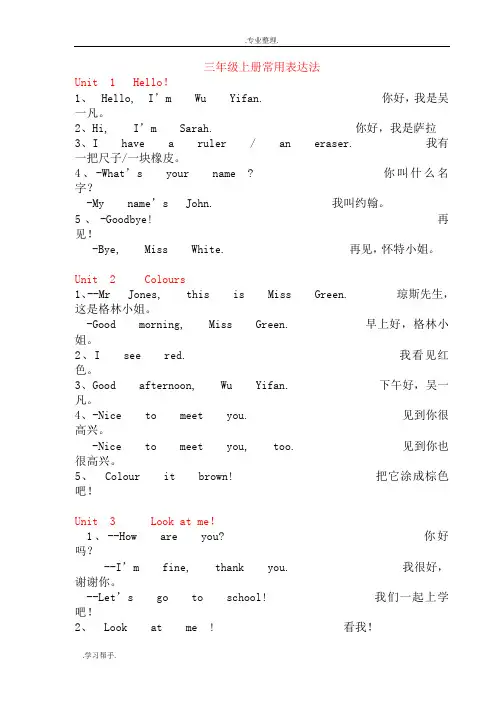
三年级上册常用表达法Unit 1 Hello!1、Hello, I’m Wu Yifan. 你好,我是吴一凡。
2、Hi, I’m Sarah. 你好,我是萨拉3、I have a ruler / an eraser. 我有一把尺子/一块橡皮。
4、-What’s your name ? 你叫什么名字?-My name’s John. 我叫约翰。
5、-Goodbye! 再见!-Bye, Miss White. 再见,怀特小姐。
Unit 2 Colours1、--Mr Jones, this is Miss Green. 琼斯先生,这是格林小姐。
-Good morning, Miss Green. 早上好,格林小姐。
2、I see red. 我看见红色。
3、Good afternoon, Wu Yifan. 下午好,吴一凡。
4、-Nice to meet you. 见到你很高兴。
-Nice to meet you, too. 见到你也很高兴。
5、Colour it brown! 把它涂成棕色吧!Unit 3 Look at me!1、--How are you? 你好吗?--I’m fine, thank you. 我很好,谢谢你。
--Let’s go to school! 我们一起上学吧!2、Look at me ! 看我!3、Very well, thanks. 很好,谢谢。
4、--Let’s make a puppet! (让)我们一起做个木偶吧!--Great! 太棒了!Unit 4 We love animals1、--What’s this? 这是什么?-- It’s a duck. (它)是只鸭子。
2、What’s that? 那是什么?3、Cool! I like it. 酷!我喜欢它。
Unit 5 Let’s eat!1、-- I’d like some juice, please. 请给我些果汁。
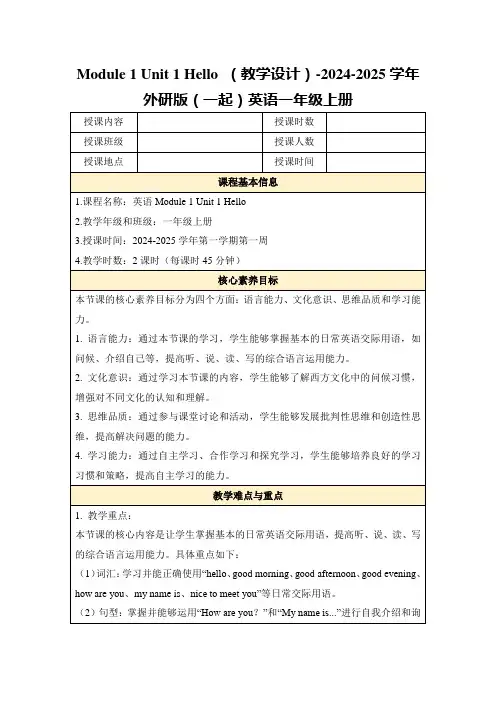
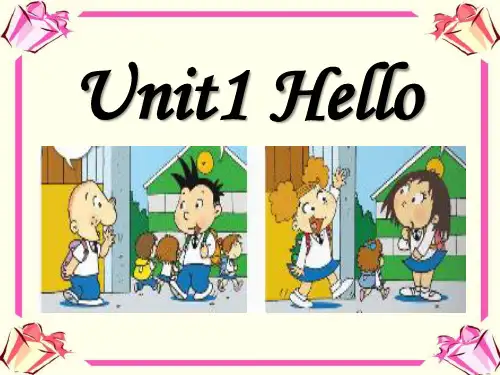
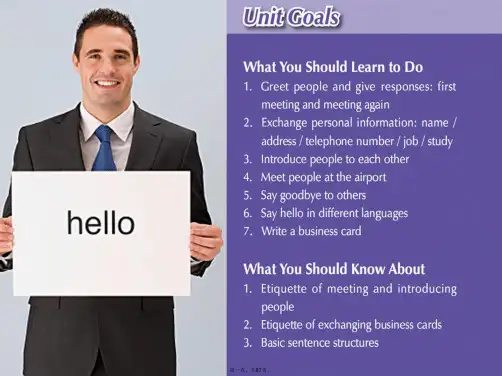
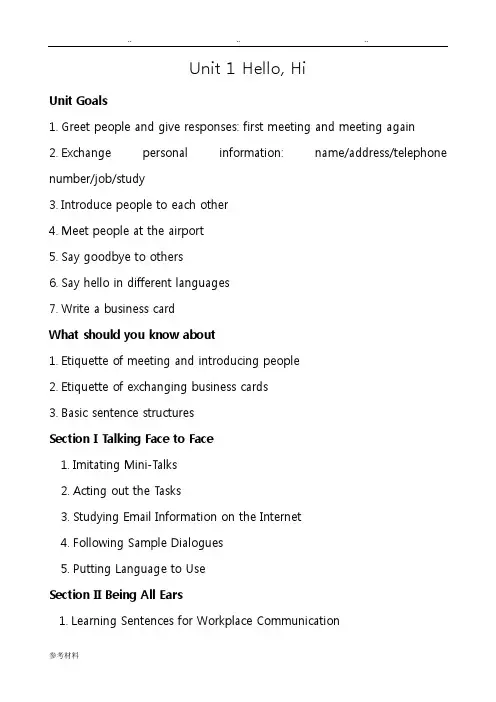
Unit 1 Hello, HiUnit Goals1.Greet people and give responses: first meeting and meeting again2.Exchange personal information: name/address/telephone number/job/study3.Introduce people to each other4.Meet people at the airport5.Say goodbye to others6.Say hello in different languages7.Write a business cardWhat should you know about1.Etiquette of meeting and introducing people2.Etiquette of exchanging business cards3.Basic sentence structuresSection I Talking Face to Face1.Imitating Mini-Talks2.Acting out the Tasks3.Studying Email Information on the Internet4.Following Sample Dialogues5.Putting Language to UseSection II Being All Ears1.Learning Sentences for Workplace Communication2.Handling a Dialogue3.Understanding a Short Speech / T alkSection III Trying your Hand1.Practicing Applied Writing2.Writing Sentences and Reviewing GrammarSection IV Maintaining a Sharp EyePassage 1 :Information Related to the Reading PassageEnglish Expressions Borrowed from FrenchOver the long years, the English language has borrowed a great number of French words or expressions. Some of them have been so absorbed in English that speakers might not realize their origin. Other expressions like “faux pas” have retained their “Frenchness”, with which spe akers tend to sound modern. These expressions are often written in italics. The following are a few French expressions which are commonly used in English.1. Faux Pas: It refers to a socially awkward or tactless act, a foolish mistake, something that should not be done. 失礼2. au pair: A foreign female student who works for a family (cleaning and/or teaching the children) in exchange for room and board. 帮助料理家务换取住宿的外国女学生3. Bon appétit: The closest English equivalent is “Enjoy your meal” . 用餐愉快4. esprit de c orps: It is similar to “group spirit” or “morale”. 团队精神5. rendez-vous: In English it means “go to”. It can be used as a noun or a verb. 约会6. RSVP: This abbreviation stands for Répondez, s'il vous plaît, which means “Respond, please”.敬请回复7. bon voyage: a way of saying goodbye and wishing good luck 一路平安The Business Card: a Social Faux PasYou, like most people, probably have been in such a situation where you are being asked for a business card, and while reaching for it ... and ... oops ... “I'm sorry, I must be out at the moment” or “they must be in my other bag” or “I left them at the office, I'm sorry,” and the conversation continues on with some sort of story about how this “never happens to me” or “I knew I was forgetting something this morning ...”Missed connections are missed opportunities for business. Business cards are a useful marketing tool, and an easy one to have with you at all times. Not having your cards can be seen as being unprepared to market yourself and your business. Don't start that new contact leaving them thinking “that person is already unprepared”.“Never leave home without it ...” There are so many things we often have to remember in this go-go world we are living in … but your business cards should ALWAYS be with you.Here are a few tips for you to go take care of this right now, so you don't get caught in this situation:✧ If you don't have a job, get Networking Cards.✧ If you are employed, and haven't had new cards in 2 or more years,it couldbe time for an update: info update and photo update ...✧ Perhaps set a goal of handing out 5 cards a day.✧ Practice what you will say when handing them out. On a daily basis, there are so many opportunities to do so. Grocery store lines, coffee shops, waiting on your car wash, meetings, and even the dog park!✧ Ask your network to network with and for you also by handing out a few!Work smarter, not necessarily harder!Language Points1 Explanation of Difficult Sentences1. (Para. 2) Missed connections are missed opportunities for business. Analysis: Missed is a verb's past participle used here as an adjective. The repeated use of the same word could bring out a stronger effect. Translation: 错失了联系就错失了商机。